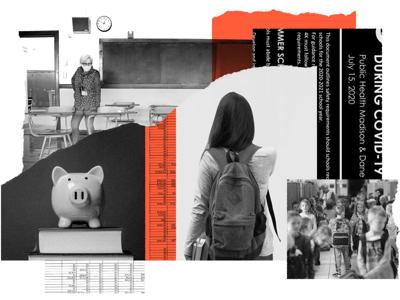A state office focused on school safety is at risk after the Republican-controlled Joint Finance Committee chose not to provide state funding Thursday.
On Wednesday before the finance committee’s funding motion was public, Attorney General Josh Kaul said losing access to a 24/7 tip line the Office of School Safety oversees would “undermine safety in Wisconsin schools.”
“It would mean effectively taking away a resource that has been in place for two years to help keep kids in Wisconsin safe, and I don’t think that’s what Wisconsinites want to see,” Kaul said.
The school safety office, which runs a 24/7 tip line that alerts Wisconsin officials to bullying, safety threats and students experiencing mental health crises, operates within the Department of Justice. It was created by a law in 2018 that authorized and funded just one position for the office: a director.
That director’s task? Oversee the administration of $100 million in federal grant funding for school safety.
The office’s responsibilities have expanded since, and its staff size and efforts were bolstered by about $1.8 million in federal funds sent to Wisconsin through the multi-trillion dollar American Rescue Plan and earmarked for the office by Gov. Tony Evers. The deadline to use that money, though, is Dec. 31.
The DOJ requested a little more than $2.2 million in its budget proposal, which would have funded 16 full-time jobs over the next biennium, including nine to staff the 24/7 tip line, called Speak Up, Speak Out (SUSO), which launched in 2020. Evers proposed less than half of that amount in his budget, but the JFC did not even include that.
The office will continue to exist, but if approved with no additional funding it would be reduced to just its director, Trish Kilpin. That means no tip line.
On Wednesday, Kaul said he believed there is “nothing more important than keeping our kids safe.”
“As both an attorney general whose top priority is public safety but also as a parent who wants our kids to be as safe as possible in school, this investment should be a no brainer,” Kaul said.
Not knowing how much might be included as of the Wednesday interview, Kaul said it was “very difficult to say” whether the department could shift any funds around from other areas to maintain the office and its tip line.
“Given the historic budget surplus we have, this is not a matter of whether the state can afford this, it’s just a question of whether the Legislature is going to prioritize school safety,” Kaul said.
He said that anything less than full funding would create uncertainty that could “hamper” efforts to staff the office and get schools to sign up. While he remained open to the possibility of obtaining the funding and position authority through standalone legislation, he said the budget process was “by far the most straightforward and clear path to finding full funding” for the office.
Kaul expressed concern that any cut to the nine staff positions needed for the tip line "would potentially seriously impair the effectiveness of that program.”
“If we were to have to cut back, for example, by cutting the hours (of) availability, what that means is that if there was a student in crisis, they may not be able to get a hold of our tip line, which could cause schools not to want to use the tip line because they may want to have something available 24/7,” he said.
Fostering a culture of seeking help
The tip line launched in 2020 featuring multiple ways for concerned individuals to submit a tip: phone call, text message or through an app.
Kilpin said tip lines like SUSO became a recommendation following the Columbine school shooting, with research in the decades since showing that “an opportunity for kids to report things in a confidential and anonymous way” is important.
Over the three years since its launch, the line has received more than 7,000 tips, including more than 100 about concerns of a planned school attack. Many of the concerns, though, are focused on mental health and school climate, with bullying leading the way at nearly 950 reports as of January of this year.
Suicide threats and depression/anxiety are also within the top six report categories, according to data from the office. Kilpin’s background is in school mental health, so adding mental health supports to help respond to some of those cases is a good fit.
When it comes to incidents that could involve a school attack, though, Kilpin stressed that there are often signs before the act occurs, and the tip line can be a key in early intervention.
“Part of the mission is really understanding adolescent and child behavior and intervening to prevent violence,” she said. “I feel like the mission stays the same, that we want to make sure we prevent harm from coming to you, whether that's a targeted attack toward others or to themselves.
“We want to be part of helping kids to feel mentally well and getting the support they need and deserve.”
While there’s no exact figure on how many schools are using the tip line since it is free for districts, Kilpin said they’ve seen how important it is for schools to create a culture of seeking help among students and staff. That allows them to overcome many of the reasons information can be kept secret, including a lack of trust or a perception of shame.
“It’s a vulnerable place to be when you’re first reaching out for assistance,” Kilpin said. “When schools have a culture of help seeking as opposed to telling on people, it's (at those schools) we're more likely to see reports.”



